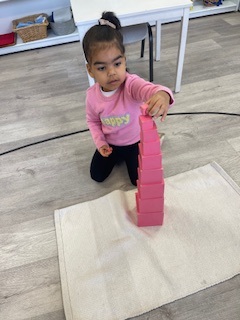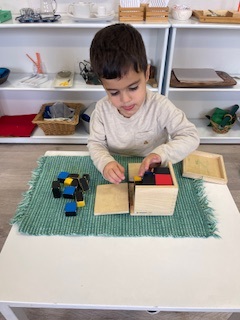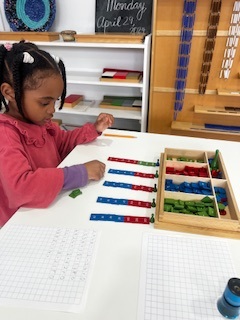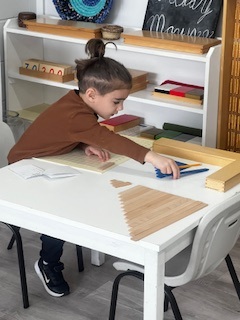Our Programs: A Montessori Journey from Ages 3½–12
At P.T. Montessori School, we offer a thoughtfully designed continuum of learning that nurtures children from early curiosity to independent exploration, guiding them through the unique stages of development that Dr. Maria Montessori identified.
Primary Program (Ages 3½–6)
In the Primary years, children are in what Montessori called the absorbent mind stage. They naturally absorb knowledge from their surroundings and are eager to explore, imitate, and understand the world around them. Learning at this age is guided by hands-on, concrete experiences that build academic, social, and practical skills simultaneously.
Areas of Development:
- Practical Life: Activities that develop independence, coordination, focus, and responsibility.
- Sensorial: Hands-on materials that refine the senses and prepare children for abstract thinking and mathematics.
- Language: Rich opportunities for oral language, storytelling, songs, phonetic and whole-language approaches to reading and writing.
- Mathematics: Concrete tools that allow children to understand numbers, quantities, and problem-solving.
- Culture: Early exposure to science, geography, history, music, and art, fostering curiosity and global awareness.
Through these experiences, children develop confidence, concentration, independence, a lifelong love of learning, and foundational skills for future academic success.
Elementary Program (Ages 6–12)
Our Elementary Program builds on the foundation established in the Primary years, guiding children from ages 6 to 12 through a Montessori curriculum that aligns and goes beyond the Ministry of Education standards.
At the Elementary level, children are naturally eager to explore the vastness of the universe and discover how they fit within it. Our curriculum begins with The Great Lessons where students are presented with a series of rich, imaginative, and “big picture” stories that ignite wonder and curiosity. These captivating narratives introduce children to the origins of the universe, the story of life on Earth, the development of human culture, and the marvels of scientific discovery. Each Great Lesson inspires follow-up projects, experiments, research, writing, and creative expression, allowing children to dive deeper into the subjects that captivate them.
From this inspiring foundation, students are encouraged to follow their interests, ask questions, and embark on meaningful, self-directed explorations across all areas of learning.
Integrated, Holistic Learning
While subjects such as Language Arts, Mathematics, Science and Technology, French, The Arts (Drama, Dance, Visual Arts, and Music), and Health and Physical Education are often taught separately in traditional schools, our approach emphasizes their interconnectedness. Students discover patterns, relationships, and meaning across disciplines, transforming learning from isolated facts into a rich, cohesive understanding of the world.
Why It Matters
In Montessori education, learning begins with inspiration, not memorization. The Great Lessons ignite curiosity and help children see that all knowledge is connected. This approach nurtures not only academic skills but also independence, critical thinking, creativity, and a deep respect for the world and humanity’s role within it.
Beyond the Classroom
Both Primary and Elementary students extend their learning beyond school walls, through field trips to museums, libraries, planetariums, botanical gardens, and local workplaces. These experiences connect academic study to real-world contexts, strengthen community awareness, and inspire children to contribute positively to society.





